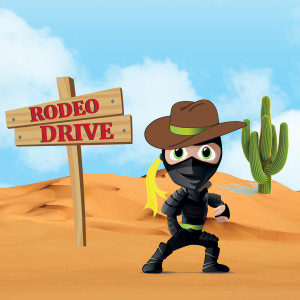Questions for a Language Ninja: Conquering Mispronunciation
Hello, and welcome to Questions from a Language Ninja! This is where the Ninja does her level best to answer complex linguistic queries, despite the fact that her qualifications come exclusively from her extensive experience in writing ransom notes. Let’s get started!
Q: Occasionally, I’ve found myself mispronouncing words with which I thought I had intimate familiarity. I thought this because I knew their definitions and had read them in various texts. How do I go about finding the accepted pronunciations?
A: Ah, now we’re in the Ninja’s wheelhouse! She certainly doesn’t want to brag, but she’s more than a little acquainted with the nuances of the International Phonetic Alphabet (or IPA, as it’s known to those of us in linguistic circles). So, let’s just take a gander at the current IPA chart and…
GAAAK! What is this? Is that Prince’s Love Symbol? WHAT DOES THIS MEAN?
Okay… so the Ninja’s a bit rusty.
If you’re not familiar with phonetic notation, it’s the symbology that denotes every vocal sound placement – even those which aren’t indicated in any alphabet. An IPA expert could transcribe a statement made by Chewbacca, and another person fluent in IPA could read it aloud completely accurately without ever having heard Chewie speak. Cool, huh?
Unfortunately, even if you are well-versed in IPA, no books are published in that format, so you’re going to have to rely on a decent dictionary.
Most (not all) American dictionaries (in print and online) use a pronunciation key that has elements of the IPA, but the key is a little more accessible to American English speakers, because the strict IPA is quite hieroglyphics-esque. However, dictionary pronunciation keys only give an approximation of how a word should sound, and they’re filled with easy-to-miss accents, which can make a considerable difference. As a result, we’ll happily pronounce the word “mauve” as mov around our interior designers, who will in turn snicker behind our backs and charge an extra $5,000 because they think we are total rubes.
There is also the small matter of flexible pronunciations: words that are pronounced differently in  different cultural contexts. For example, in the U.S., a rodeo is an event where cowboys exhibit their skills at rope twirling and avoiding permanent neurological damage from being kicked in the head by livestock. However, Rodeo is also a fussy street in Beverly Hills, California. If you are either speaking Spanish or talking about the street (but only the one in Beverly Hills), the pronunciation is ro-DAY-oh. Any other time, it’s RO-dee-oh. Confusing the two will result in everlasting ridicule, so take note.
different cultural contexts. For example, in the U.S., a rodeo is an event where cowboys exhibit their skills at rope twirling and avoiding permanent neurological damage from being kicked in the head by livestock. However, Rodeo is also a fussy street in Beverly Hills, California. If you are either speaking Spanish or talking about the street (but only the one in Beverly Hills), the pronunciation is ro-DAY-oh. Any other time, it’s RO-dee-oh. Confusing the two will result in everlasting ridicule, so take note.
If you’re very concerned about pronouncing words “correctly” (i.e., understandably to native speakers), then make the effort to familiarize yourself with the pronunciation key of a good print or online dictionary. This way, whenever you look up a word, you’ll be able to get the gist of the pronunciation structure fairly easily. Often, just knowing where the syllable stress is will do the trick.
The Ninja doesn’t really have any unfamiliar word pronunciation hacks. If you’re not a student of etymology and don’t have time to wander the wilderness of phonemes, try to use the Google word pronunciation audio feature whenever you happen to look up a word online. (It’s the little bullhorn icon that sometimes appears, and sometimes doesn’t.)
If you still mispronounce the occasional word, just explain that you’ve only ever read the word and haven’t heard it spoken. Add that you read it while completing your dissertation on Archimedes while getting your PhD from Harvard. Hopefully, this will diffuse the smugness of whomever corrected you.
Holly Troupe is a professional web content writer and an amateur everything else. She spends her days writing, eating, and looking for ways to incorporate the term “perfidy” into the urban vernacular.

